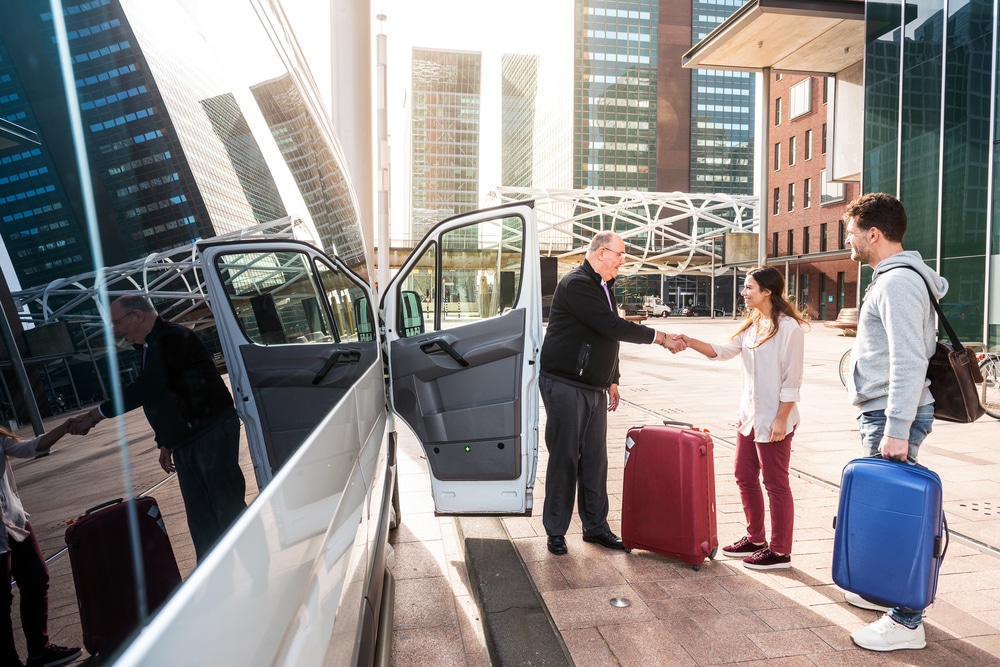
90 English Tourism Vocabulary Words and Phrases [With Sample Dialogues]
English is the most common language used in the international tourism industry.
People who work in the tourism industry use it to communicate with tourists from all over the world.
If you work in tourism or hope to find a job in the industry, it helps to know the right words and phrases for this type of work.
In this guide, I’ll show you some of the most useful tourism vocabulary you’ll need to know for a range of situations!
Contents
- Interacting with Customers
- Common Scenarios in Tourism English
- Jobs in Hospitality and Tourism
- More Tourism Vocabulary in English
- How to Learn English Tourism Vocabulary
- And One More Thing...
Download: This blog post is available as a convenient and portable PDF that you can take anywhere. Click here to get a copy. (Download)
Interacting with Customers

Greeting Customers
You always want to welcome customers or guests with a friendly, professional greeting:
- Good morning (before 12 p.m.)
- Good afternoon (between 12 p.m. and 5 p.m.)
- Good evening (after 5 p.m.)
- Welcome to… [company name]. My name is… [your name].
Be sure to always use a respectful term to refer to your customers:
For example, using these terms you can now greet customers in a very respectful way:
If you are working at a hotel, restaurant or tour agency, you can greet a customer and then ask them this question:
Do you have a reservation with us?
To answer the phone, you only need one simple phrase:
Hello, you’ve reached [company name]. This is [your name]. How may I help you?
If you are working with customers in a hotel, before they go to their rooms you can say one of these phrases:
- We hope you enjoy your stay!
- Please let us know if you have any questions or comments during your stay.
Asking Customers Questions
You will want to make sure your customers are safe and happy while they are with you. You can do this by asking friendly and polite questions, such as:
- How are you doing this morning? (or afternoon/evening)
- Have you been having a good time?
- Is there anything else we can do to make your experience more enjoyable?
Responding to Questions
Customers will have many questions, and sometimes you will not know the answer. You may need to ask a coworker or supervisor. When this happens, you can use the following phrases:
- I will get that information for you right away.
- That’s a great question! I will check with my supervisor and let you know.
Checking for Understanding
As a guide, host or receptionist, you will need to double-check for understanding. These phrases are simple and quick ways to make sure you have understood the guest or customer:
- I heard you ask (about flights). Is that correct?
- So, you said (you wanted to visit the ruins), right?
- Okay, I understand that (your flight leaves at 3 PM). Is that correct?
To ask for clarification
Your guest may use vocabulary that you are unfamiliar with. Likewise, they might have an accent that is difficult for you to understand. Here are some polite ways to ask them to repeat or clarify what they said:
- I’m sorry, I didn’t quite understand that. Can you say that again?
- Pardon my English, but I didn’t understand that. Can you say that again?
- I’m sorry, I didn’t catch that. Can you describe what you mean?
To invite your guests to ask questions
You can make all of your guests feel welcome by encouraging them to ask questions:
- Does anyone have any questions?
- Yes, sir? / Yes, ma’am? Do you have a question?
- Please feel free to raise your hand any time if you have a question.
- So, any questions?
FluentU takes authentic videos—like music videos, movie trailers, news and inspiring talks—and turns them into personalized language learning lessons.
You can try FluentU for free for 2 weeks. Check out the website or download the iOS app or Android app.
P.S. Click here to take advantage of our current sale! (Expires at the end of this month.)

Common Scenarios in Tourism English

When working in tourism, you might need to give directions to tourists, share recommendations for a good restaurant or attraction or make friendly conversation.
In these scenarios, you will play the part of the “guide,” but it could be any job where you interact with tourists. Practice these dialogues so you feel confident using these words and phrases in your interactions.
Giving Recommendations
- For (authentic cuisine, family activities, etc.), I recommend…
- My favorite place is…
- Personally, I suggest…
Dialogue
Tourist: Excuse me, do you know a good place for ice cream?
Tourist: Great, thanks!
Giving Directions
If you work in tourism, you will need to give directions to visitors. Here are some key phrases you might use to explain how to get somewhere:
- Turn left
- Turn right
- Go straight
- Stop at the…
- Continue until…
- Take the subway (or bus, train, etc.)
- Follow the signs for…
- At the traffic light
- At the next street (or light, block, etc.)
- In five blocks
- Near the hotel (or beach, station, etc.)
- On the main plaza
See this post for more words and phrases for giving directions:
How to Ask for and Give Directions in English: 200+ Essential Words and Phrases
Asking for and giving directions in English is a helpful skill, and this guide will show you the important vocabulary you need to know, with audio pronunciation included!…
Dialogue
Tourist: Can you tell me how to get to the theater?
Tourist: Yes, thank you!
Here’s a helpful video to practice basic phrases for giving directions:
Making Friendly Small Talk
Here are some phrases that you can use when you want to make friendly conversation with a guest or visitor:
- So, are you enjoying your time in (Paris) so far?
- Tell me, what is your favorite part of the city so far?
- What do you think of the (architecture, food, beach, festival, etc.)?
Jobs in Hospitality and Tourism

This vocabulary will help you a lot when you are working in the tourism industry or searching for jobs.
Jobs at Hotels and Resorts
- Bellhop / baggage handler — the person who will open the front door for guests and carry their bags to their rooms
- Concierge / receptionist — the person at the front desk who welcomes the guests, gives out room keys, helps guests make reservations and takes payments for reservations
- Maid / housekeeper — the person who cleans the hotel rooms (see English vocabulary for housekeeping here)
- Janitor — the person responsible for cleaning everything outside of hotel rooms, such as the lobby and other common areas
- Groundskeeper — the person who takes care of all the plants outside the hotel
- Maintenance worker — the person who fixes anything that stops working in the hotel
- Manager / supervisor — the person who makes sure everything goes well at the hotel, hires employees, teaches new employees how to do their jobs and makes sure that guests are happy
- Event planner — the person who makes sure the hotel is ready for big events such as business conventions (meetings) or weddings
Here are a couple of vocabulary guides for working in hotels:
English for Receptionists: 20 Essential Phrases for Hotel Staff | FluentU English Blog
Practicing English for receptionists can help you greet and assist hotel guests with ease. By studying the right phrases, you can prepare yourself to handle common…
100+ Essential Hotel Vocabulary Words in English [With Audio] | FluentU English Blog
Knowing hotel vocabulary in English is essential if you want to work in the hospitality industry. Check out our list of 100+ vocabulary words and phrases on everything…
Bar and Restaurant Staff
These jobs might exist at a hotel if it has a bar and/or restaurant.
- Bartender — the person who makes and serves drinks at the bar
- Host / hostess — the person who stands at the entrance to the restaurant and welcomes guests, brings them to a table and takes reservations on the phone and in person
- Server / waiter / waitress — the person who serves customers who are eating at the restaurant (“waiter” refers to a male, “waitress” refers to a female and “server” can refer to any gender)
- Busboy / busser — the person who makes sure that tables are clean and ready for customers
- Chef / cook — the person who prepares food at the restaurant
If you work or want to work in a bar or restaurant, check out this vocabulary guide next:
English for Restaurant Staff: 6 Positions and 200+ Essential Vocabulary and Phrases [With Audio!] | FluentU English Blog
Click here to learn English for restaurant staff! Here, we have information about six essential restaurant positions, the common phrases used by each one and study…
Jobs at Travel and Tourism Companies
There are entire companies that exist just to help travelers book their trips. If you work for one of these companies, you will either work in an office or outside the office helping travelers enjoy their time in your city or country.
- Secretary / administrative assistant — someone who takes care of the whole office by organizing paperwork, making and receiving phone calls, organizing the office schedule and taking reservations for tours and trips
- Travel agent — someone who helps people find the most affordable flights, hotels, etc. and helps them buy tickets and make reservations before they travel
- Tour guide — someone who goes out with tourists and takes them on adventures to explore towns, cities, farms, mountains, jungles and more
- Taxi driver / private driver — someone who drives tourists in a taxi or private car between different places, and sometimes on a tour around the area
- Shuttle driver — someone who drives a large vehicle (usually a small bus or large van) to transport groups of people between places, such as from the hotel to some popular tourist destinations or between the hotel and the airport
- Airline agent — someone who works at the desk of an airline (a company that owns airplanes and provides transportation services with them)
- Flight attendant — someone who takes care of passengers on airplanes by serving food and drinks and giving safety instructions (see English vocabulary for flight attendants here)
- Cruise attendant — someone who takes care of people on boats and ships by doing the same things as flight attendants, providing services like food and drinks and giving safety instructions
- Translator — someone who translates between different languages in writing, such as for tourism guides or flyers
- Interpreter — someone who translates between two languages by listening and speaking, often to help tourists and visitors understand and speak with local people
- Recreational guide — someone who goes with tourists to do activities like yoga, surfing, cycling, running, hiking and climbing mountains
More Tourism Vocabulary in English
Here is a list of common tourism-related English words. You might be asked questions with these words or you might need to use them yourself. Make sure you’re familiar with them and can use them in full sentences.
- Tourist – someone who travels to different places for enjoyment or to see new things
- Attractions — places of interest that are often visited by tourists, such as museums or amusement parks
- Landmark – a special or famous place that people can easily recognize, often used for giving directions
- Destination – a place to which people travel for leisure, business or other purposes
- Guide – a person who helps tourists by showing them around and giving them information about a place
- Guidebook – a book that provides information for travelers about a particular destination, including attractions, hotels and restaurants
- Souvenir – a small item that people buy to remember a place they visited, like a keychain or a postcard
- Itinerary – a plan or schedule that shows the activities or places someone will visit during their trip
- Accommodation – a place where travelers can stay overnight, such as a hotel, hostel or campground
- Transportation – the way people travel from one place to another, such as by car, bus, train or airplane
- Passport – a document issued by a government that proves a person’s identity and nationality, allowing them to travel internationally
- Visa – a stamp or document given by a country’s government that allows someone to enter or stay in that country for a certain period of time, usually for tourism, work, or study
- Business district — also called the financial district, this is the center of the city where many offices, banks and companies are located
- Entertainment district — a part of a city where there are lots of restaurants, bars, theaters and other fun places
- Dining district — an area within a city with a lot of restaurants
- Custom — a traditional way of doing something that is common in a particular culture or society
- Highlight — the most interesting or exciting part of something, often the main attraction
- Scenery — the natural features of an area, such as mountains, rivers or forests, that people find beautiful to look at
- Surroundings — the area or environment around a particular place, including nearby buildings, landscapes and neighborhoods
- Depart — to leave from a place, especially when traveling
- Arrive — to reach or get to a place or destination, especially when traveling
- Recommend — to suggest or advise someone to do something because you think they will enjoy it
How to Learn English Tourism Vocabulary
- Read the “English for International Tourism” textbooks. They are available in low-intermediate, intermediate and high-intermediate levels. As long as you have a foundation in English, this series is perfect for learning how to communicate with coworkers and tourists in different tourism-related scenarios. Here are some more English for Tourism books we recommend.
- Take an English for Tourism course. You can find some great courses on Udemy, such as this English for Business and Tourism course aimed at low-intermediate to intermediate students. Or take lessons with a tutor who specializes in tourism on Preply.
- Complete tourism English courses on Memrise. Focus on Memrise English courses for tourism. These lessons feature English vocabulary words and phrases that anyone in the tourism industry would use in their daily activities. Try spending at least 30 minutes a day using Memrise to brush up on your tourism vocabulary—you’ll notice a difference!
- Follow travel vloggers on YouTube. Look for channels or specific videos about the place where you will be working. Engage in discussions in the comments as well! Not only will that make using YouTube more fun, but it will also require you to learn and use new words during your chats back and forth with others.
- Participate in discussions on travel forums. Travel forums allow you to use your new tourism vocabulary with native speakers and practice written English. On TripAdvisor, you can talk with English speakers about traveling, hotels, restaurants, transportation and more. The /r/travel subreddit is a great place to talk about everything related to tourism.
- Give yourself daily homework. A great place to start is the tourism section of ESL Conversation Questions. You’ll find a variety of tourism-related topics that you can discuss with your friends and coworkers. If you’re a hospitality professional, check out Oxford University Press’ free online workbook series, English for Careers.
Bookmark this page so you can come back and view this tourism vocabulary whenever you have some free time.
Soon you will be able to communicate with any tourist who crosses your path!
Download: This blog post is available as a convenient and portable PDF that you can take anywhere. Click here to get a copy. (Download)
And One More Thing...
If you like learning English through movies and online media, you should also check out FluentU. FluentU lets you learn English from popular talk shows, catchy music videos and funny commercials, as you can see here:
The FluentU app and website makes it really easy to watch English videos. There are captions that are interactive. That means you can tap on any word to see an image, definition, and useful examples.
For example, when you tap on the word "searching," you see this:
Learn all the vocabulary in any video with quizzes. Swipe left or right to see more examples for the word you’re learning.

FluentU helps you learn fast with useful questions and multiple examples. Learn more.
The best part? FluentU remembers the vocabulary that you’re learning. It gives you extra practice with difficult words—and reminds you when it’s time to review what you’ve learned. You have a truly personalized experience.
Start using the FluentU website on your computer or tablet or, better yet, download the FluentU app from the iTunes or Google Play store. Click here to take advantage of our current sale! (Expires at the end of this month.)





